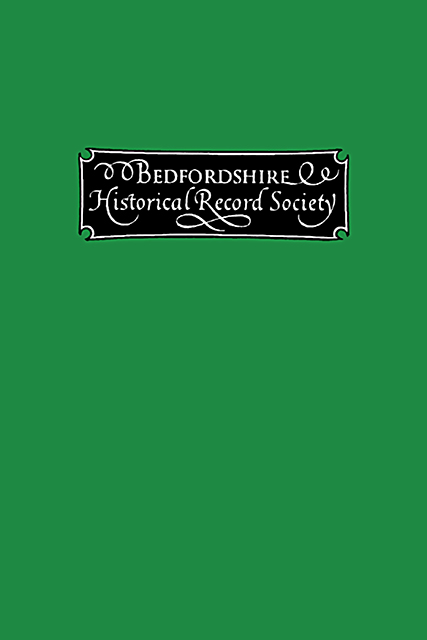Book contents
- Frontmatter
- Contents
- Rules for Transcription
- Abbreviations in Common Use
- The Assessment of Knight Service in Bedfordshire: No. II.
- St. John of Southill
- Some Saxon Charters
- A Late Example of A Deodand
- Domesday Notes : II. Kenemondwick.
- The Hillersdens of Elstow
- Grant of Free Warren to Newnham Priory
- Cutenho, Farley Hospital, and Kurigge.
- Munitions In 1224
- The Becher Family of Howbury
- Yttingaford and the Tenth-Century Bounds of Chalgrave and Linslade
- The Paper Register of St. Mary’S Church in Bedford, 1539-1558
- Calendar of Inquisitions Post Mortem. No. I.
- Notes and Queries
- Index
- Miscellaneous Endmatter
A Late Example of A Deodand
Published online by Cambridge University Press: 14 July 2023
- Frontmatter
- Contents
- Rules for Transcription
- Abbreviations in Common Use
- The Assessment of Knight Service in Bedfordshire: No. II.
- St. John of Southill
- Some Saxon Charters
- A Late Example of A Deodand
- Domesday Notes : II. Kenemondwick.
- The Hillersdens of Elstow
- Grant of Free Warren to Newnham Priory
- Cutenho, Farley Hospital, and Kurigge.
- Munitions In 1224
- The Becher Family of Howbury
- Yttingaford and the Tenth-Century Bounds of Chalgrave and Linslade
- The Paper Register of St. Mary’S Church in Bedford, 1539-1558
- Calendar of Inquisitions Post Mortem. No. I.
- Notes and Queries
- Index
- Miscellaneous Endmatter
Summary
Deodands were abolished as from the 1st September, 1846, by the Statute 9 and 10 Vict. Cap. 62, but had long previously ceased to be recorded or even noticed by Manor Juries. The latest record of a Deodand in the Rolls of the Manor of Luton is at a Court of Francis Herne, Esquire, held on the 18th May, 1758. The following is a transcript of the entry.
“Be it remembered that on the day of 1758 I Thomas Groome of the parish of Kings Langley in the County of Hertford, Gentleman, Did by the order direction and for the use of Francis Herne Esquire Lord of the Manor of Luton in the County of Bedford seize and take one horse belonging to Benjamin Hanbury of the Borough of Saint Alban in the County of Hertford Innholder as and for a Deodand to the said Francis Herne for and by reason a servant belonging to the said Benjamin Hanbury was Drowned from off the back of the said Horse in a certain water or place lying within the said Manor of Luton called Shire Moor and that afterwards the said Benjamin Hanbury did pay for and as a Composition for the said Horse the sum of Five Shillings in regard the said Horse was very old poor and of little value.”
The Town Moor at Luton was bounded on the east by the river Lea and on the west by the road to Dunstable. The river in 1758 must have been very much deeper than it has been any time during the last thirty years.
[For the meaning of the word, and for early examples of Deodands, see B.H.R.S., iii, p. 142, entry 343, and note thereto; other examples may be found from the Index to that volume. The immediate cause of death, the inanimate object the value of which was to be given to God for the appeasing of his wrath, is ordered in the Gloucester Pleas of 1221 to be given to some pious object on God’s behalf (pro Deo), but in the Bedford Pleas of 1227 it is to be given on the King’s behalf (pro Rege), presumably as God’s vice-gerent.]
- Type
- Chapter
- Information
- Publisher: Boydell & BrewerFirst published in: 2023



